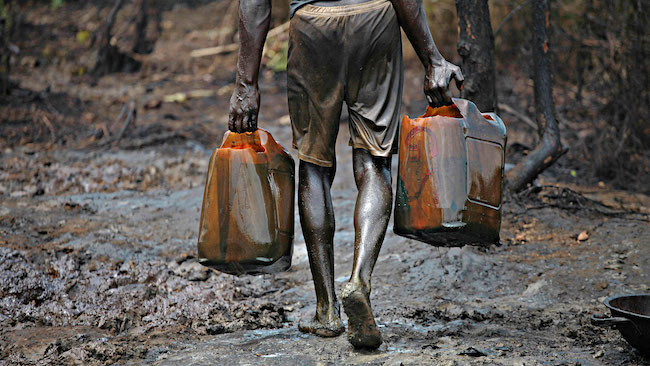Business
Oil theft killing economy, as 265 illegal refineries uncovered in SPDC corridor

As Nigeria continues to struggle with oil theft, Chief Timipre Sylva, Minister of State for Petroleum Resources, has disclosed that there are over 265 illegal refineries in just the Shell Petroleum Development Company (SPDC) corridor.
On Thursday in Lagos, Sylva delivered a speech at the 60th anniversary of the Oil Producers Trade Section (OPTS) of the Lagos Chamber of Commerce and Industry (LCCI) over the situation.
The minister was represented by Mr Kamaru Busari, Acting Permanent Secretary, Ministry of Petroleum Resources.
He said vandalism and oil theft had resulted in Nigeria producing less than one million barrels of crude oil per day.
When oil prices were sky-high on the global market, Sylva claimed that the nation’s inability to satisfy its Organization of the Petroleum Exporting Countries (OPEC) quota had prevented it from receiving much-needed oil money.
Nevertheless, he claimed, in order to increase investor confidence in the industry, the government was working with host communities, security organisations, and technology to address the problem.
The Nigerian National Petroleum Business Ltd.’s (NNPCL) Group Chief Executive Officer, Malam Mele Kyari, said the company was aware of the current issues, including security in the operational regions and the settlement of cash call arrears.
Kyari, represented by Mr Dapo Segun, Deputy General Manager, Treasury, NNPCL, however, maintained that the company was resilient and would work with other stakeholders to overcome the security challenges.
Read also: NNPC launches app to monitor crude oil theft, pipeline vandalism
He said: “We have deployed creative solutions to tackle security challenges in the operational areas.
“Technological intervention for both monitoring and prompt intervention would also be set up. The tackling of the menace is a top priority for NNPCL.
“Also, our new governance framework provides us autonomy and opportunity for self-accounting hence cash-call settlement including arrears would be settled and handled promptly going forward.”
Nigerian production fell in the first seven months of the year to about 1.1 million barrels a day of crude equivalent in July from over 1.4 million barrels in January, according to the Organisation of the Petroleum Exporting Countries (OPEC).
The average quota set by OPEC for Nigeria is 1.73 million barrels per day during the period.
The Nigerian government has attributed its low output to large-scale theft of crude and related pipeline sabotage. This damage has reduced exports, forced some companies to shut down production, and crippled the country’s fiscal stability.
Join the conversation
Support Ripples Nigeria, hold up solutions journalism
Balanced, fearless journalism driven by data comes at huge financial costs.
As a media platform, we hold leadership accountable and will not trade the right to press freedom and free speech for a piece of cake.
If you like what we do, and are ready to uphold solutions journalism, kindly donate to the Ripples Nigeria cause.
Your support would help to ensure that citizens and institutions continue to have free access to credible and reliable information for societal development.




















